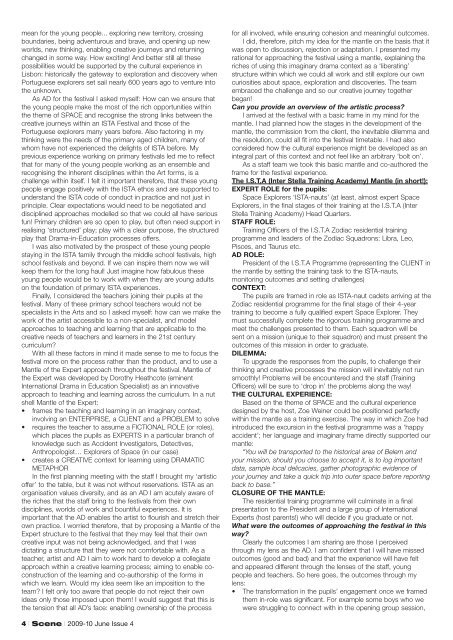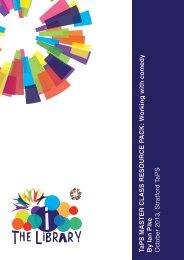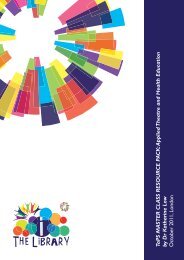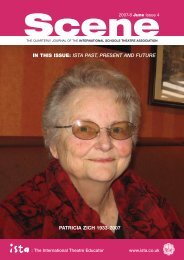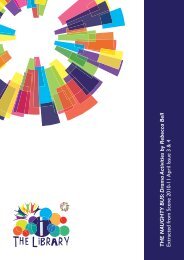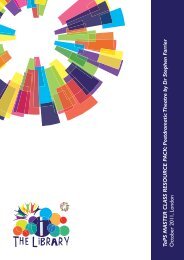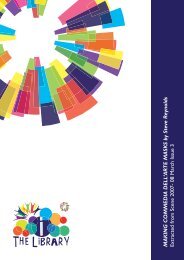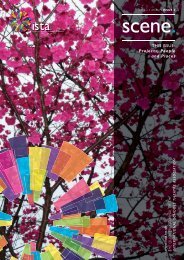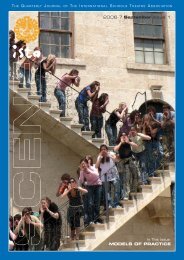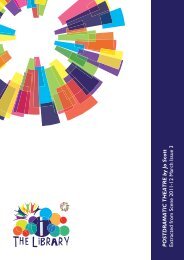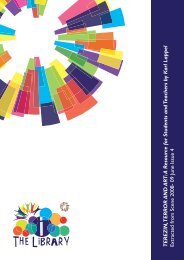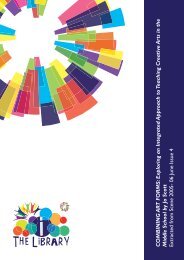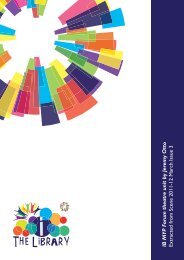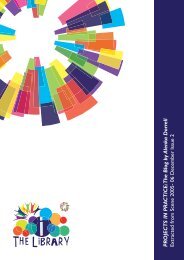Create successful ePaper yourself
Turn your PDF publications into a flip-book with our unique Google optimized e-Paper software.
mean for the young people... exploring new territory, crossing<br />
boundaries, being adventurous and brave, and opening up new<br />
worlds, new thinking, enabling creative journeys and returning<br />
changed in some way. How exciting! And better still all these<br />
possibilities would be supported by the cultural experience in<br />
Lisbon: historically the gateway to exploration and discovery when<br />
Portuguese explorers set sail nearly 600 years ago to venture into<br />
the unknown.<br />
As AD for the festival I asked myself: How can we ensure that<br />
the young people make the most of the rich opportunities within<br />
the theme of SPACE and recognise the strong links between the<br />
creative journeys within an <strong>ISTA</strong> Festival and those of the<br />
Portuguese explorers many years before. Also factoring in my<br />
thinking were the needs of the primary aged children, many of<br />
whom have not experienced the delights of <strong>ISTA</strong> before. My<br />
previous experience working on primary festivals led me to reflect<br />
that for many of the young people working as an ensemble and<br />
recognising the inherent disciplines within the Art forms, is a<br />
challenge within itself. I felt it important therefore, that these young<br />
people engage positively with the <strong>ISTA</strong> ethos and are supported to<br />
understand the <strong>ISTA</strong> code of conduct in practice and not just in<br />
principle. Clear expectations would need to be negotiated and<br />
disciplined approaches modelled so that we could all have serious<br />
fun! Primary children are so open to play, but often need support in<br />
realising ‘structured’ play; play with a clear purpose, the structured<br />
play that Drama-in-Education processes offers.<br />
I was also motivated by the prospect of these young people<br />
staying in the <strong>ISTA</strong> family through the middle school festivals, high<br />
school festivals and beyond. If we can inspire them now we will<br />
keep them for the long haul! Just imagine how fabulous these<br />
young people would be to work with when they are young adults<br />
on the foundation of primary <strong>ISTA</strong> experiences.<br />
Finally, I considered the teachers joining their pupils at the<br />
festival. Many of these primary school teachers would not be<br />
specialists in the Arts and so I asked myself: how can we make the<br />
work of the artist accessible to a non-specialist, and model<br />
approaches to teaching and learning that are applicable to the<br />
creative needs of teachers and learners in the 21st century<br />
curriculum?<br />
With all these factors in mind it made sense to me to focus the<br />
festival more on the process rather than the product, and to use a<br />
Mantle of the Expert approach throughout the festival. Mantle of<br />
the Expert was developed by Dorothy Heathcote (eminent<br />
International Drama in Education Specialist) as an innovative<br />
approach to teaching and learning across the curriculum. In a nut<br />
shell Mantle of the Expert:<br />
• frames the teaching and learning in an imaginary context,<br />
involving an ENTERPRISE, a CLIENT and a PROBLEM to solve<br />
• requires the teacher to assume a FICTIONAL ROLE (or roles),<br />
which places the pupils as EXPERTS in a particular branch of<br />
knowledge such as Accident Investigators, Detectives,<br />
Anthropologist… Explorers of Space (in our case)<br />
• creates a CREATIVE context for learning using DRAMATIC<br />
METAPHOR<br />
In the first planning meeting with the staff I brought my ‘artistic<br />
offer’ to the table, but it was not without reservations. <strong>ISTA</strong> as an<br />
organisation values diversity, and as an AD I am acutely aware of<br />
the riches that the staff bring to the festivals from their own<br />
disciplines, worlds of work and bountiful experiences. It is<br />
important that the AD enables the artist to flourish and stretch their<br />
own practice. I worried therefore, that by proposing a Mantle of the<br />
Expert structure to the festival that they may feel that their own<br />
creative input was not being acknowledged, and that I was<br />
dictating a structure that they were not comfortable with. As a<br />
teacher, artist and AD I aim to work hard to develop a collegiate<br />
approach within a creative learning process; aiming to enable coconstruction<br />
of the learning and co-authorship of the forms in<br />
which we learn. Would my idea seem like an imposition to the<br />
team? I felt only too aware that people do not reject their own<br />
ideas only those imposed upon them! I would suggest that this is<br />
the tension that all AD’s face: enabling ownership of the process<br />
for all involved, while ensuring cohesion and meaningful outcomes.<br />
I did, therefore, pitch my idea for the mantle on the basis that it<br />
was open to discussion, rejection or adaptation. I presented my<br />
rational for approaching the festival using a mantle, explaining the<br />
riches of using this imaginary drama context as a ‘liberating’<br />
structure within which we could all work and still explore our own<br />
curiosities about space, exploration and discoveries. The team<br />
embraced the challenge and so our creative journey together<br />
began!<br />
Can you provide an overview of the artistic process?<br />
I arrived at the festival with a basic frame in my mind for the<br />
mantle. I had planned how the stages in the development of the<br />
mantle, the commission from the client, the inevitable dilemma and<br />
the resolution, could all fit into the festival timetable. I had also<br />
considered how the cultural experience might be developed as an<br />
integral part of this context and not feel like an arbitrary ‘bolt on’.<br />
As a staff team we took this basic mantle and co-authored the<br />
frame for the festival experience.<br />
The I.S.T.A (Inter Stella Training Academy) Mantle (in short!):<br />
EXPERT ROLE for the pupils:<br />
Space Explorers ‘<strong>ISTA</strong>-nauts’ (at least, almost expert Space<br />
Explorers, in the final stages of their training at the I.S.T.A (Inter<br />
Stella Training Academy) Head Quarters.<br />
STAFF ROLE:<br />
Training Officers of the I.S.T.A Zodiac residential training<br />
programme and leaders of the Zodiac Squadrons: Libra, Leo,<br />
Pisces, and Taurus etc.<br />
AD ROLE:<br />
President of the I.S.T.A Programme (representing the CLIENT in<br />
the mantle by setting the training task to the <strong>ISTA</strong>-nauts,<br />
monitoring outcomes and setting challenges)<br />
CONTEXT:<br />
The pupils are framed in role as <strong>ISTA</strong>-naut cadets arriving at the<br />
Zodiac residential programme for the final stage of their 4-year<br />
training to become a fully qualified expert Space Explorer. They<br />
must successfully complete the rigorous training programme and<br />
meet the challenges presented to them. Each squadron will be<br />
sent on a mission (unique to their squadron) and must present the<br />
outcomes of this mission in order to graduate.<br />
DILEMMA:<br />
To upgrade the responses from the pupils, to challenge their<br />
thinking and creative processes the mission will inevitably not run<br />
smoothly! Problems will be encountered and the staff (Training<br />
Officers) will be sure to ‘drop in’ the problems along the way!<br />
THE CULTURAL EXPERIENCE:<br />
Based on the theme of SPACE and the cultural experience<br />
designed by the host, Zoe Weiner could be positioned perfectly<br />
within the mantle as a training exercise. The way in which Zoe had<br />
introduced the excursion in the festival programme was a ‘happy<br />
accident’; her language and imaginary frame directly supported our<br />
mantle:<br />
“You will be transported to the historical area of Belem and<br />
your mission, should you choose to accept it, is to log important<br />
data, sample local delicacies, gather photographic evidence of<br />
your journey and take a quick trip into outer space before reporting<br />
back to base.”<br />
CLOSURE OF THE MANTLE:<br />
The residential training programme will culminate in a final<br />
presentation to the President and a large group of International<br />
Experts (host parents!) who will decide if you graduate or not.<br />
What were the outcomes of approaching the festival in this<br />
way?<br />
Clearly the outcomes I am sharing are those I perceived<br />
through my lens as the AD. I am confident that I will have missed<br />
outcomes (good and bad) and that the experience will have felt<br />
and appeared different through the lenses of the staff, young<br />
people and teachers. So here goes, the outcomes through my<br />
lens:<br />
• The transformation in the pupils’ engagement once we framed<br />
them in-role was significant. For example some boys who we<br />
were struggling to connect with in the opening group session,<br />
4 | <strong>Scene</strong> | 2009-10 <strong>June</strong> Issue 4


